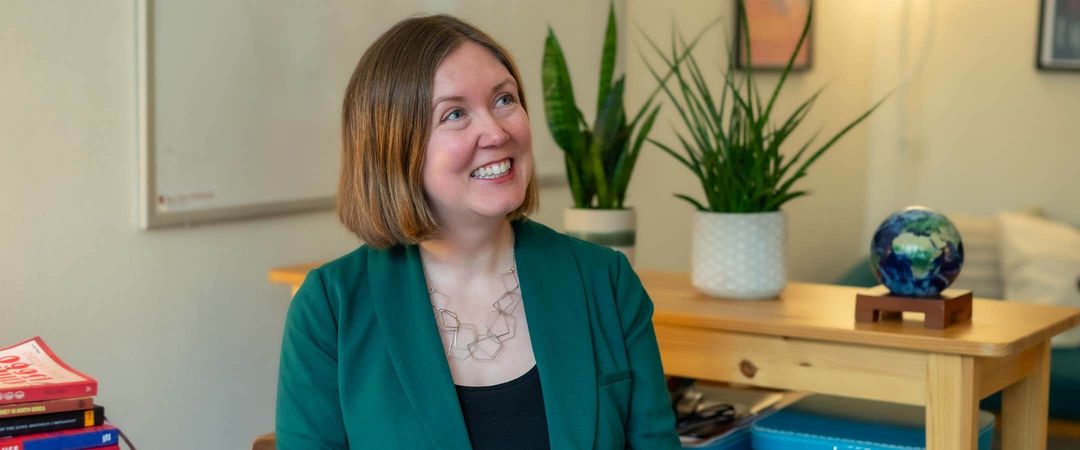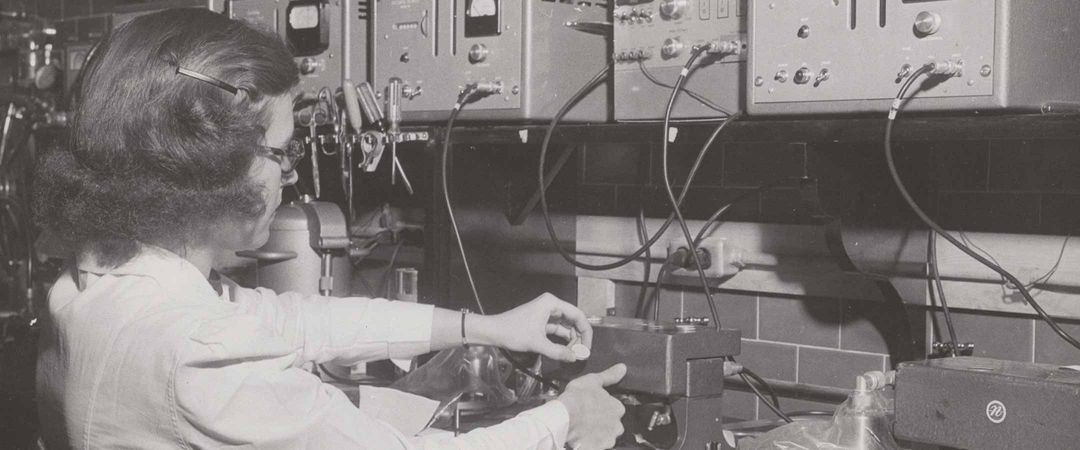Lena Vincent PhD’22 was a molecular biologist working in biomedical science before the relatively young field of astrobiology — the study of the origins and distribution of life in the universe — caught her eye. “When I discovered [astrobiology] was a thing,” Vincent says, “I knew that’s what I wanted to do because I couldn’t think of questions that fascinated me more as a person and as a scientist.”
After earning a master’s degree in biology from California State University–Northridge, Vincent came to the UW and joined botanist David Baum’s lab, Understanding the Origins and Evolution of Life on Earth, as a PhD student. She also worked with the Wisconsin Institute for Discovery experimenting with the chemical components and conditions that could have sparked life on Earth.
Today, Vincent is continuing her research as a postdoctoral fellow at NASA’s Jet Propulsion Lab, managed by the California Institute of Technology. She breaks down much of her work for space experts and novices alike on social media under the handle @astrobiolena, sharing easy-to-understand TikToks and otherworldly Instagram images.
Why do you think questions about the origins of life are innate in humans?
We all want to know where we came from. We want to have an understanding about where we fit in the world. And I think a logical extension of that is figuring out how we got here and thinking about the history of life on Earth. So, I think that’s part of it. We are existential beings. We think about who we are and our place in the universe, and I think it’s perfectly natural. And I do think everybody has that to some extent. Do they think about it every single day in their professional lives? No. But I do think everyone’s wondered at least once, “How did this all get started? How did we get here?”
Why are questions about the origins of life so difficult to answer?
I think it’s important to acknowledge that we really don’t know. We have lots of good ideas about how it might have happened, but we really don’t know for sure. And part of that is that we can’t go back in time and watch it. We can’t watch it happen in real time. We don’t have access to time machines, at least not to my knowledge. So we can’t watch this event that we’re interested in understanding happen in real time and use it to validate all of the models and scenarios we come up with now as scientists.
We only have the example of life on Earth, and it all shares a common ancestry and, as far as we can tell, a common origin. And we don’t have other examples of origins of life. It’s a very, very tricky thing to tackle scientifically, because normally in science you like to have multiple examples of things. And we don’t have that luxury when we study the origin of life.
When scientists discuss the possibility of life on other planets, what might that look like? Are we talking E.T.?
The fairest way to answer that is we don’t know. We are doing our best to keep an open mind. And again, that’s a difficult thing to do in science. When you tackle a problem, you need a specific problem. You need a specific set of observations. Having a big wishy-washy concept of what it is you’re looking for isn’t super helpful. But we are trying to remain open-minded. And we’re not trying to bias the techniques and the approaches we use to search for life elsewhere by looking for a specific kind of life. That being said, practically speaking, we can only look for and recognize what we know.
When you look at the diversity of life on Earth, the vast majority of it is microbial. If you look at the entire four billion years [Earth has] been here, it’s been dominated by microbes. If we use probability alone, it seems like microbes are the most likely form of life to form elsewhere. But that is also a very biased and narrow view because it assumes that the things that govern possible origins of life on other worlds are the same as here.
Do you find it difficult to research subjects so far out of reach?
No, I don’t think so. I might have worried about that when I was first getting started, and that these are really difficult questions. It’s so big picture and it’s so unlike other fields in that it really is on the cutting edge, and we really don’t know. We don’t have a lot of answers. But to me, it’s what makes it really exciting. I love that we can take these big problems and cut them up into really, really small pieces and then use the tools of science to try to make progress. Like I said, there’s no bigger question I can think of that we can answer as humans. So, I personally don’t find it discouraging. I actually find it quite motivating.
Why did you decide to start posting about your work on social media?
It was a little bit by accident. In August of 2021, I was compelled to upload a video, not about science. It was actually about how to give good scientific presentations. And it was inspired by this trend or movement on TikTok where people were using it as an educational platform. I just tried it out. I gave a few facts about how to use PowerPoint to give a good science presentation, and it kind of blew up. And that started a series of videos. When that came to an end, I wondered if anyone would be interested in the science I do and astrobiology. So, I started making a couple of videos reporting on newsworthy things that had happened in astrobiology. People started asking questions and that gave me more content ideas and it just snowballed from there.










